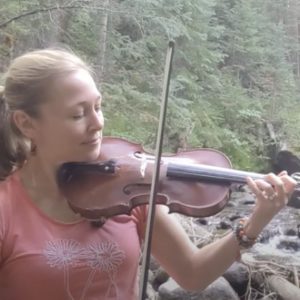Editor’s note: And now, a moment of serenity before the start of Fall 2020 classes. Take care, Rams.

Assistant Professor Rebekah Kading plays “Meditation” by Jules Massenet at the Fossil Creek Reservoir Natural Area in Fort Collins.
The last five months have inspired people around the globe to find novel ways to cope and connect during the COVID-19 pandemic. Many of them, including Colorado State University Assistant Professor Rebekah Kading, have turned to music.
Kading has studied infectious diseases since her days as an undergraduate at the University of Delaware. She majored in entomology and wildlife conservation and went on to receive a master’s degree in entomology from the University of Arkansas and a doctoral degree in molecular microbiology and immunology from Johns Hopkins Bloomberg School of Public Health.
Kading spent eight years at the Centers for Disease Control and Prevention Division of Vector-borne Diseases in Fort Collins before she joined the faculty at CSU in January 2016. During her time at CSU, she has been studying how bats transfer viruses to humans and is also part of a team working on a vaccine to combat potentially fatal Rift Valley fever virus, which is found across Africa and has emerged in the Middle East.
She recently posted a video of herself playing “Meditation” by French composer Jules Massenet on the violin. In a short description on YouTube, Kading said she was inspired to play the piece with the backdrop of majestic Colorado scenery.
Kading spoke with SOURCE about her background in music, struggles during the pandemic and her current research. Subscribe to her YouTube channel: https://col.st/HNivf
Q: What made you decide to create the video?
Kading: It’s a very turbulent time now in general in our country with the pandemic and political and societal tensions. I’ve been reflective about that and I’ve been using my quarantine time to get back into music, to have a creative outlet to relieve stress. I’m not the only person struggling right now. I felt if I shared this music, it might touch somebody in a positive way. It’s a peaceful and relaxing to try and counteract some of the negativity that’s out there.
Q: What is it about that particular piece that you enjoy?
Kading: It inspires meditation. It’s a beautiful melody and it is used in weddings a lot. It’s something I’ve been playing for a long time and it is soothing to me. The music lends itself well to being in a beautiful environment.
Q: How long have you been playing the violin?

Kading: I first started when I was four and a half years old and I’ve taken some significant breaks from playing over the years. But it’s something I can pick up and get back into shape with. As different seasons of life come along, I miss it, and the opportunity comes along to pick it back up and embrace it.
My husband plays guitar, and we’re in the band at church together. That’s how we met. My son plays the piano. My mother also plays the piano and her sister is the violinist. That’s what got her interested in signing me up to play when I was little.
Q: Could you talk a little bit about the current tumultuous time, and how many people are seeking peaceful outlets?
Kading: It’s been a very trying time, trying to balance home and professional responsibilities. Working from home, the kids have schoolwork to do virtually and I fulfill multiple roles simultaneously. The separation between working and parenting is gone.
Days are longer, and I work with continuous distractions, keeping up with deadlines and meetings. The spring was a struggle to get through the school year and summer has been the same. A lot of the camps we signed up for were canceled. We are finishing a marathon and going into another one, with no break.
I know a lot of people are in the same situation. That’s why I’ve decided to share music, which provides me with an escape and it helps me release energy in a positive way. I hope it will do the same for others who listen.
Q: How’s your research going?

Kading: I’m mostly working from home. I go in to the lab to support research projects or help with mosquito colony maintenance as needed. With the international work I’ve picked up, my days can start at 6 or 7 a.m. with Zoom calls on the other side of the world.
My work is extended into the night, when the kids go to bed. I need to be available during the day for drop-offs and appointments with my boys, ages 5, 6 and 11. It makes the workday longer.
In my lab, we’re back to 50% capacity and we’ve been able to get some experiments started back up on most of the projects we had going. We are focusing on the ones that have deadlines that need to be met, including gathering data that’s needed for dissertation work and high-priority items. My field work in Uganda is on hold.
I’ve written two grant proposals with collaborators to look at coronavirus diversity in North American bats. If those projects get funded, it will bring some field work to northern Colorado.
Q: How does it feel as a researcher studying infectious diseases to be experiencing this pandemic?
Kading: From a science perspective, it’s an exciting time to be a virologist. From a human perspective, I have concerns and stresses like everyone. I’m trying to live through it, adapt, address and follow public health guidelines.
Given the role I’m in, I’m also helping to develop some guidelines for the International Union for the Conservation of Nature Species Survival Commission Bat Specialist Group.
It’s an interesting place to be and time in our lives.